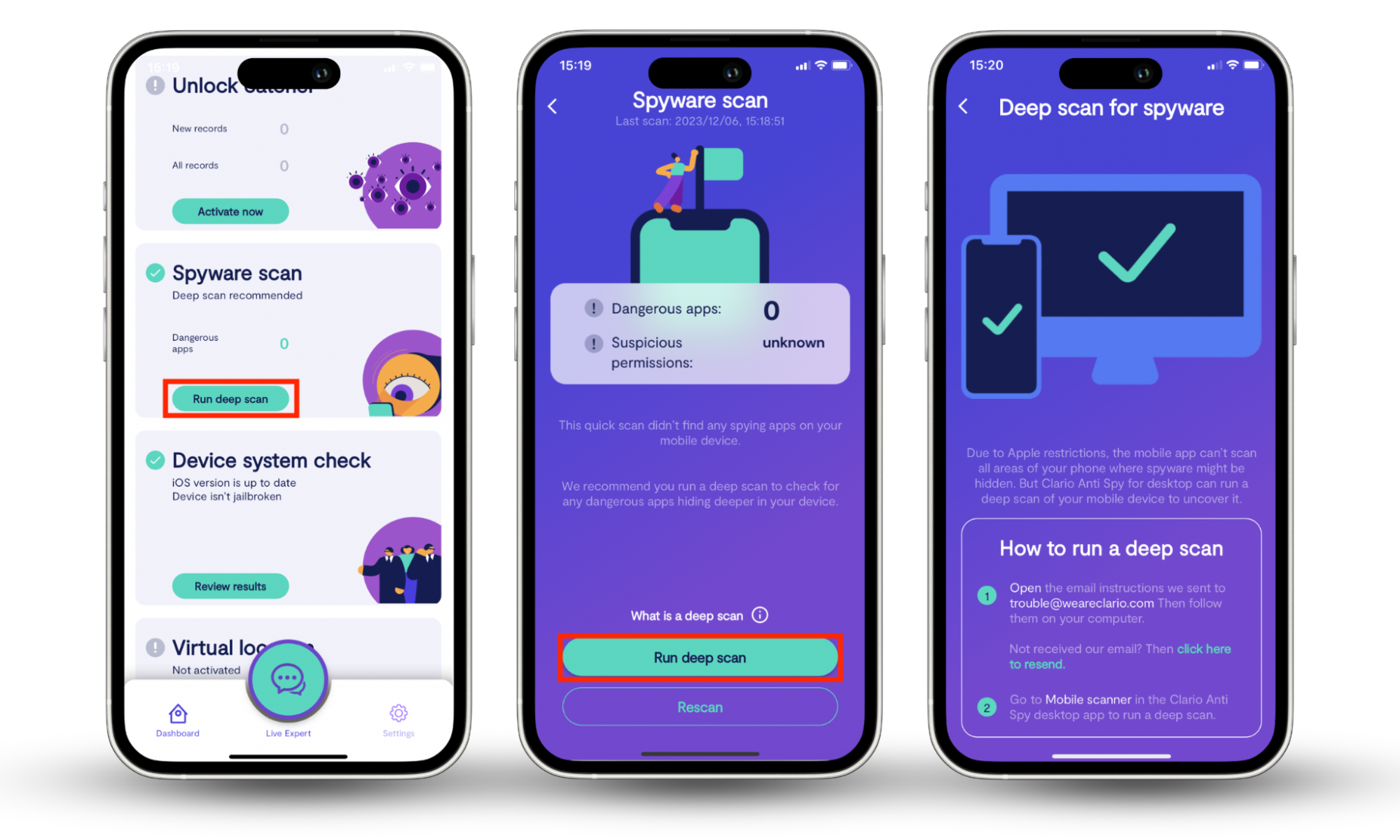Table of contents
- What is stalking?
- Do dumpers stalk their exes?
- Why do dumpers stalk their exes?
- How to know if your ex who broke up with you is stalking you
- How to stop your ex from stalking you
- 1. Get help if you think you are in danger
- 2. Use anti-stalking software
- 3. Create new passwords
- 4. Clear your social networks
- 5. Make your profiles and online materials private
- Conclusion
What is stalking?
Stalking definition
Stalking is when someone repeatedly follows or contacts a person in a way that makes them feel scared or uncomfortable. It can happen in person or online and is a serious crime with severe consequences.
Stalking might involve following someone, monitoring their activities, making unwanted contact, or other intrusive actions.
Do dumpers stalk their exes?
Unfortunately, yes. Some dumpers begin to stalk their exes after the breakup. A study from the University of Western Ontario in 2012 showed that up to 90 percent of people “check up” on their exes on Facebook after the breakup.
While this “checking up” doesn’t always mean they’re stalking you, it’s a worrying sign. Stalking is generally driven by an unhealthy obsession with the other person, a desire for control, or unresolved feelings—many things an ex may feel about you.
Why do dumpers stalk their exes?
Dumpers stalk their ex for a variety of reasons. In general, stalking behavior is often driven by emotional issues. This could include insecurity, obsession, or an inability to let go of the relationship.
It can also be a way for the dumper to monitor their ex's activities or establish a sense of connection, even if that connection is unwanted by the other person.
A dumper might stalk their ex because they have:
- Unresolved romantic feelings
- A desire for control or power
- A sense of jealousy
- A sense of possessiveness
- A need for validation
In any case, stalking is a harmful and unacceptable behavior that can have serious consequences for the victim.
How to know if your ex who broke up with you is stalking you
If you’re unsure if your ex is stalking you, pay attention to these warning signs:
- Unexpected sightings: If you keep running into your ex in places where you didn't expect to see them, they might be following you.
- Unexplained messages or calls: If you receive repeated, unwanted messages or calls from your ex, especially at odd hours, it could be a sign of stalking behavior.
- Social media monitoring: If your ex likes, comments, or shares your posts on social media, or if they create fake accounts to keep tabs on you, they’re probably stalking you online.
- Personal information: If your ex brings up details about your life or activities that you haven't shared with them, they may be collecting this information through stalking.
- Feeling watched or followed: Trust your instincts–if you feel like you are being watched, followed, or monitored, listen to your gut and seek help.
Stalking is a serious issue that can have severe consequences, so it’s crucial to take steps to protect yourself and ensure your safety. We’ll explain how in the next section.
How to stop your ex from stalking you
To stop your ex from stalking you, you need to be proactive. Take these steps to ensure that your ex can’t track your location and activities:
- Get help if you think you are in danger
- Use anti-stalking software
- Create new passwords
- Clear your social networks
- Make your profiles and online materials private
1. Get help if you think you are in danger
If an ex is stalking you and you feel like you’re in danger, you need to seek help immediately. Here are some steps you can take to ensure your safety:
- Contact the police: If you feel in immediate danger, call 911 or your local emergency services. The police can provide immediate assistance.
- Obtain a restraining order: You can seek a restraining order against your ex to legally force them to stay away from you. Contact a local legal aid organization for information on how to get a restraining order on your ex.
- Reach out to a domestic violence hotline or shelter: There are many organizations and shelters that provide support to people experiencing stalking and domestic violence. They can help you create a safety plan and connect you with additional support services.
- Inform friends, family, and coworkers: Let trusted people in your life know about the situation so they can help keep an eye out for you.
- Document the stalking behavior: Keep a record of any incidents of stalking, including dates, times, and details of the behavior. Having proof of stalking behavior can help if you need to get a restraining order or take legal action against your ex.
- Consider seeking counseling or therapy: Dealing with being stalked can be overwhelming. A therapist or counselor may be able to provide emotional support and coping strategies.
2. Use anti-stalking software
Anti-stalking software can help protect you from unwanted behavior from your ex. Here are some reasons why you should use anti-stalking software if your ex is stalking you.
Anti-stalking software like Clario Anti Spy monitors your online accounts for suspicious activity. This can alert you to potential threats and help you take necessary precautions.
It can also help protect your personal information and prevent your ex from tracking your location or accessing sensitive data. This can help safeguard your privacy and safety and stop cyberstalking.
Here is how to use Clario Anti Spy’s Spyware scan:
- Open Clario Anti Spy and scroll down to Spyware scan.
- Click Run deep scan.
- Wait until the scan is finished, then check whether Clario Anti Spy has discovered any spy apps. If it has, it will explain how to get rid of them.

3. Create new passwords
Creating new passwords for your online accounts will prevent your ex from gaining access. They may already know your passwords (or they may have installed spyware on your device to find them out). In either case, changing your passwords can protect you.
Here’s how to create new passwords:
- Use strong, unique passwords: Create a 12-character unique password for each online account, including letters, numbers, and special characters.
- Avoid personal information: Don’t use easily guessable information, like your name, birthday, or common words. A random combination of letters and numbers is best.
- Update security questions: Consider updating your security questions and answers to things your ex doesn’t know.
- Use a password manager: A password manager can help generate and store your unique passwords, providing better security than a written note.
- Enable two-factor authentication: Enable two-factor authentication for your accounts to add an extra layer of security and prevent unauthorized access even if your ex knows your password.
Note
If you’re concerned that your ex already has access to your devices or online accounts, here’s how to check if your phone is hacked or not. If you find out that it is, take the steps outlined in that article to safeguard your accounts and lock your ex out.
4. Clear your social networks
Clearing your social media accounts can be important if you are being stalked by an ex to protect your privacy and prevent unwanted contact. If your ex broke up with you but stalks your Instagram, you should do everything in your power to stop them from seeing your activity.
And if you’re wondering, “Do guys stalk their exes on social media?,” the answer is yes.
Why you should clear your social media accounts:
- Prevent access to personal information: By clearing your social media accounts, you can stop your ex from accessing personal information, photos, posts, and contacts that they might use to track or harass you.
- Avoid unwanted communication: Removing your ex from your social media accounts can stop them from contacting you.
- Protect your online reputation: Clearing your social media accounts can also help protect your reputation and prevent your ex from spreading false information about you.
Here’s how to clear your social media accounts:
- Remove your ex from your friends or contacts list: Unfriend, block, or unfollow your ex on all social media platforms to prevent them from accessing your posts and updates.
- Adjust privacy settings: Review and update your privacy settings on social media to control who can see your posts, profile information, or contact you.
- Review and remove personal information: Go through your social media accounts and remove any personal information. Look for phone numbers, addresses, or details that can be used to track or identify you.
- Review and delete past interactions: Delete any past interactions, messages, or photos that may connect you to your ex or give them information about your current whereabouts.
- Limit location sharing: Turn off location-sharing features to prevent your ex from tracking your movements.
5. Make your profiles and online materials private
While it’s important to clear your social media accounts, you must also improve your digital hygiene in other ways. The less information available about you online, the harder it will be for someone to track you.
Be selective about what information and content you share online, and consider customizing sharing settings to control who can see your posts, photos, and other materials.
You should also periodically review and update your privacy settings to ensure your profiles remain private and secure. Stay informed about changes to privacy policies on social media platforms and adjust your settings accordingly.
The utmost protection is to remove yourself from social media altogether, although that isn’t an option for everybody. Instead, consider creating alias accounts under different names to stay in touch with family while avoiding your stalker.
Conclusion
Dealing with a situation where your ex broke up with you but stalks you can be frightening and overwhelming. It’s important to prioritize your safety and well-being by seeking help and taking proactive steps to protect yourself.
From seeking assistance from law enforcement to utilizing anti-stalking software and updating your online security measures, hopefully, the strategies we’ve outlined in this article will help you address the threat of stalking by an ex-partner.
Also, do not forget that stalking is a severe violation, and it might mean that your ex would go to any extent to have an idea of what you’re up to, including spying. Use Clario Anti Spy to see if you are in danger.


